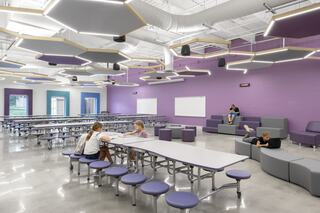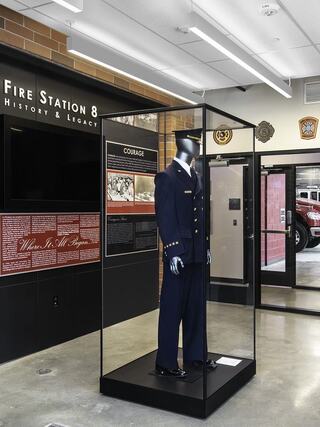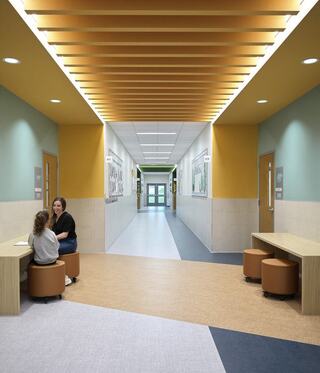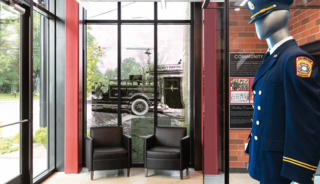
FGMA Designs Transformative Learning Spaces for Community Colleges in the St. Louis Region
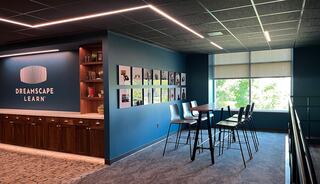
FGM Architects (FGMA) designs sustainable and future-ready facilities where students can thrive by creating adaptable areas for students to learn as technology evolves.
St. Louis Community College (STLCC) recently held its ribbon cutting on July 31 to reveal their new Transportation Education Center (TEC). Shortly after, on Aug. 8, St. Charles Community College (SCC) hosted their ribbon cutting ceremony for the new Center for Immersive Learning (CIL) that incorporates Dreamscape Learn virtual reality programming.
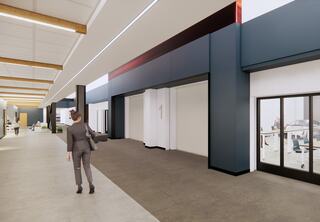
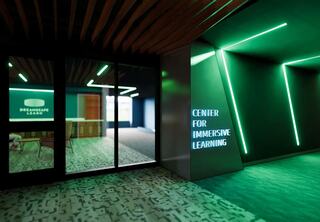
Transforming Higher Education with Architectural Design Innovation
FGMA has been working with both STLCC and SCC to design transformative learning environments that enhance student experiences and facilitate learning in new, technologically advanced spaces.
Although the innovative approach in each project differs, both colleges are rising to the challenge of redefining next-generation education: higher education design that integrates immersive, hands-on learning exposes students to the latest technology and creates healthier, human-centered, engaging spaces for students.

St. Louis Community College Drives Innovation Through New Era of Transportation Education
At its Forest Park campus, STLCC recently celebrated the grand opening of their new 79,000 sf Transportation Education Center, designed by FGMA. This project is one of many included in the STLCC Transformed initiative that is modernizing facilities and programming to meet student demand and expectations.
The new center will allow students throughout the region to access expanded career opportunities through this significant campus expansion. The new TEC includes hands-on automotive and diesel labs, truck driving simulators, dynamic classroom space and areas for student and faculty engagement and collaboration. The project also includes a newly paved, 193,000 sf truck driving training lot.

The central theme surrounding the new facility is “connection.” The need for a centralized, expanded TEC was born through the college’s connection to the community, understanding of workforce needs throughout the region, and a desire to join their three transportation programs under one roof. The design for the facility centers around creating connections: the lab areas are connected to the more traditional classroom and office spaces by the “link” — a two-story atrium used to filter daylight ing to the lower level and provide an engaging collaboration space.
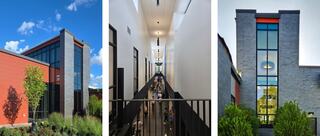
The labs were designed with flexibility to enable programs to adapt as the industry evolves. Students will receive hands-on training in state-of-the-art labs that offer natural light and views, A/V technology, durable finishes and acoustic treatment for an enhanced learning experience.
"The result of this remarkable transportation education center is a hub where citizens from the city of St. Louis, St. Louis County and beyond will receive standard-setting education in automotive technology, diesel technology and truck driving,” said Campus President and Chief Academic Officer Julie Fickas, Ed.D. “Every inch of the space has been designed to support immersive, hands-on learning that directly prepares students for the demands of the workforce."
.jpg)
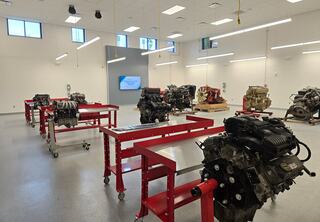
St. Charles Community College Piloting Immersive Learning in Community College Spaces
FGMA partnered with St. Charles Community College (SCC) to repurpose an underutilized office suite into the Center for Immersive Learning.
SCC is the first in the Midwest to incorporate Dreamscape Learn, an enhanced learning experience for students that blends cinematic storytelling and immersive technology.
.JPG)
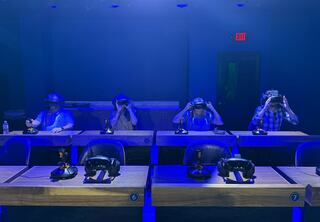
The center will include a virtual reality (VR) classroom, a “free-roam pod” where students use VR technology to explore and move around freely, and developer stations for students to learn how to build their own VR experiences.
By putting students at the center of an immersive VR narrative and connecting that experience to their classroom instruction and lectures, students stay engaged and connected to their work and thrive in their programs.
“Our students will be better prepared for careers and for navigating the future and everything that comes their way,” said SCC President Dr. Barbara Kavalier. "With the cutting of the ribbon, we are symbolically giving way to a new chapter in the college, to a new standard for innovation in higher education, and a new future for every single student that walks through these doors and steps into worlds undiscovered.”
The initial Dreamscape Learn program was implemented at Arizona State University in 2022, resulting in higher grades and retention rates, more engagement and greater peer collaboration.
"The design for the CIL was born out of a sense of wonder and curiosity,” said FGMA Vice President and Principal Lori Everett, AIA, NCARB, LEED AP, who was the project manager for this transformation. “We wanted the experience to begin long before you put on the headset, allowing the mystery and excitement to build as you journey down the corridor and through the explorer’s lounge, which features rich, saturated color, playful patterns and dynamic lighting."
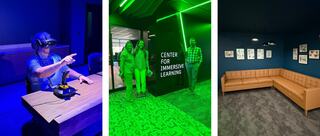
How Community-Centered and Technology-Forward Design in Education Improves Collaboration
“FGMA strives to build community on campus,” said Lori. “These important spaces support programs that promote student success by encouraging them to occupy campuses longer and for a variety of meaningful experiences. This reinforces a commitment to academic excellence and student engagement, preparing students to excel not only academically but professionally and personally as well.”
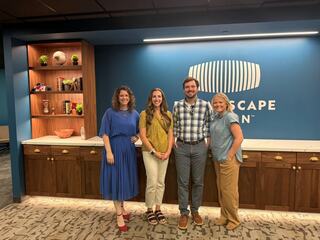
News & Insights
All Articles
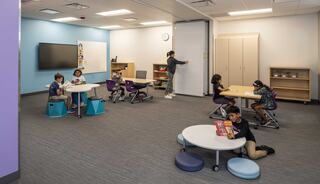
Boost Students’ Academic Experiences with Small Group Learning Pods
